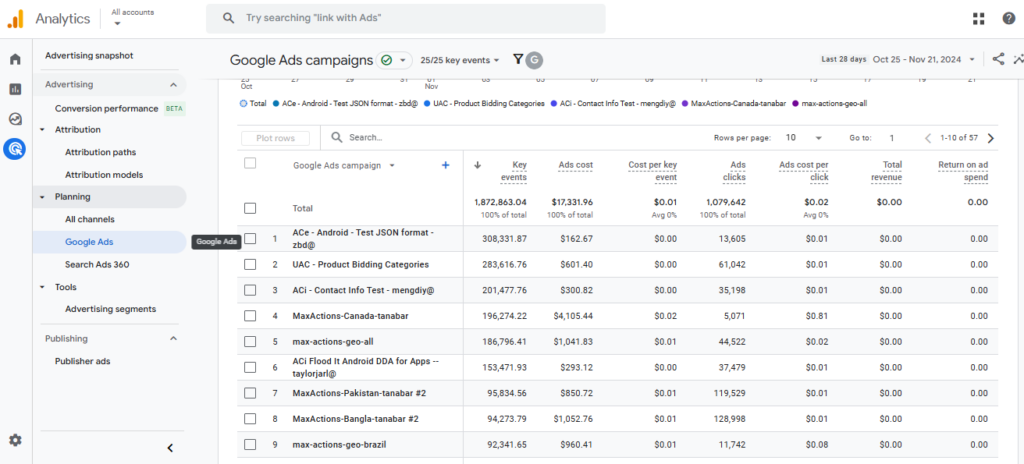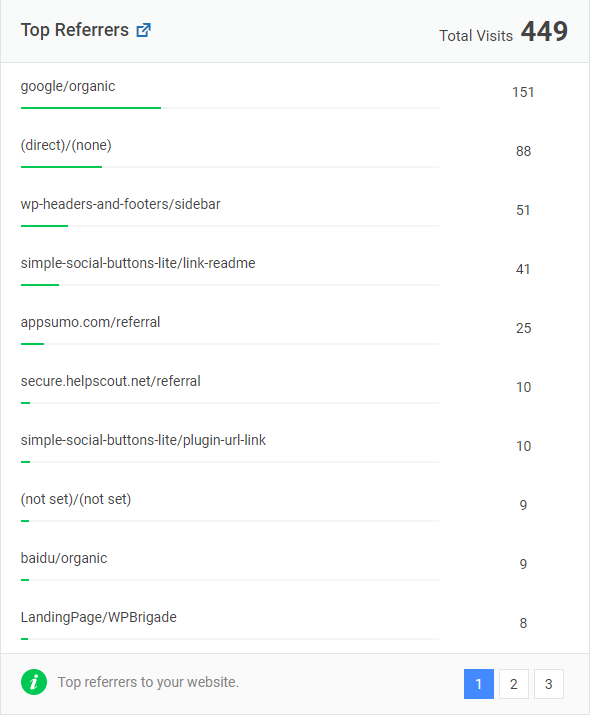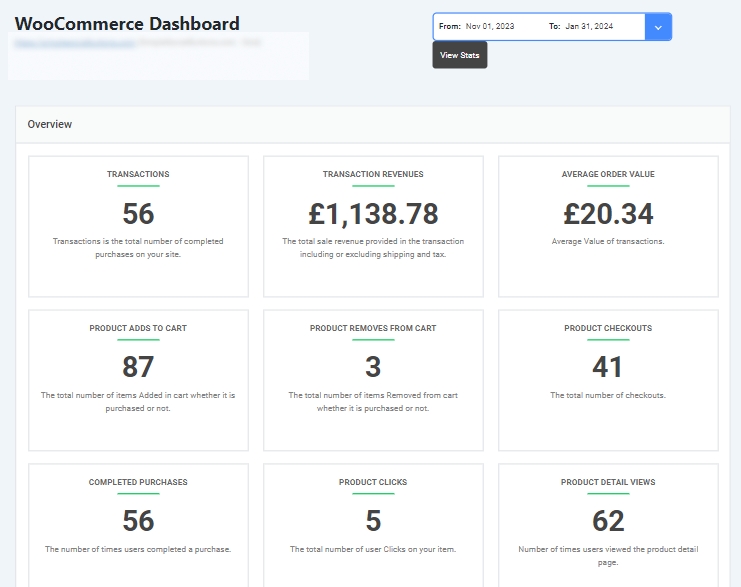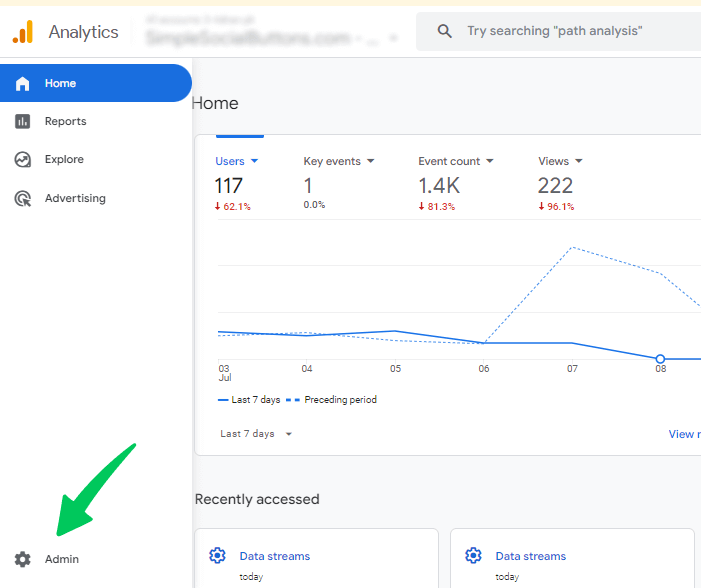
Paid Search Analytics: Ultimate Guide to Measure PPC Success
Do you want to learn about paid search analytics in detail? If so, you’re in the right place.
Paid search, often synonymous with Pay-Per-Click (PPC) advertising, has revolutionized how businesses reach their target audiences online. With billions of searches happening every day, using paid search ensures your business stands out amidst the competition. However, success in PPC isn’t just about running ads; it’s about understanding and analyzing their performance.
This is where Paid Search Analytics comes into play. By tracking and analyzing key metrics, you know what works and what doesn’t.
In this guide, we’ll explore everything you need to know about Paid Search Analytics, from the tools you need for effective PPC Tracking to advanced strategies for analyzing your campaigns.
Paid Search Analytics (TOC):
What is Paid Search Analytics?
Paid Search Analytics refers to the process of tracking, measuring, and analyzing data from paid search campaigns, such as Google Ads or Microsoft Advertising. It includes monitoring key metrics like impressions, clicks, conversions, and costs to assess the overall performance of your PPC campaigns.
Paid search analytics is the backbone of any successful PPC campaign. It provides insights into how your ads are performing, where your budget is being utilized, and what results you’re achieving. Without analytics, paid search efforts would be a shot in the dark, leaving businesses guessing about their campaign effectiveness.
Key Metrics You Need to Track
Understanding PPC Tracking involves paying close attention to specific metrics that directly impact campaign success:
- Click-Through Rate (CTR): Measures how compelling your ad is by tracking the percentage of clicks it gets from impressions.
- Conversion Rate: Indicates how effectively your ad drives users to take the desired action, such as making a purchase or signing up.
- Cost Per Click (CPC): This helps control spending by showing how much you’re paying for each click.
- Cost Per Acquisition (CPA): Shows the cost of acquiring a customer through your ad campaign.
- Return on Ad Spend (ROAS): Measures the revenue generated compared to your ad spend.
- Quality Score: A Google Ads metric that affects your CPC and ad placements, based on ad relevance and landing page quality.
Paid Search vs. Organic Search Analytics
While both paid and organic search analytics focus on understanding audience behavior, Paid Search Analytics zeroes in on metrics specific to PPC campaigns, such as ad spend, keyword performance, and bidding strategies. Organic search, on the other hand, looks at metrics like organic traffic, rankings, and engagement without the influence of paid ads.
Why is PPC so Important?
Running a PPC campaign without measuring its performance is like driving without a map — you might move forward, but there’s no guarantee you’ll reach your destination. Analyzing your PPC efforts through paid search analytics, such as a detailed PPC account health check, not only provides clarity but also ensures your budget is used effectively.
The Importance of Measuring PPC Success:
- Optimize Ad Spend for Better ROI
Tracking key metrics allows businesses to identify where their money is going and adjust budgets to focus on high-performing keywords and campaigns. - Enhance Campaign Performance with Data-Driven Decisions
Insights from PPC Tracking help fine-tune targeting, bidding strategies, and ad creatives, leading to improved click-through rates and conversions. - Identify and Rectify Underperforming Ads
Analytics highlight which ads are failing to deliver results, enabling businesses to tweak or eliminate them to avoid wasted spend. - Understand Audience Behavior and Preferences
Paid Search Tracking uncovers valuable information about who is interacting with your ads, when, and why. This insight helps tailor campaigns to match audience intent. - Justify Marketing Investments
By using tools like Paid Search Google Analytics, marketers can demonstrate tangible results to stakeholders, showcasing the impact of PPC on revenue and growth.
Tools for Effective Paid Search Tracking
Tracking the performance of your paid search campaigns requires the right tools. These tools enable you to measure, analyze, and act on data to improve the outcomes of your PPC efforts. Let’s explore some of the most effective platforms for Paid Search Analytics.
1. Google Analytics (GA4)
Google Analytics (GA4) is a powerful and free tool for analyzing your paid search traffic. It integrates seamlessly with Google Ads and offers insights into user behavior, helping you optimize campaigns for better performance.
Let’s explore some essential GA4 features that will elevate your Paid Search Analytics strategy.
Traffic Acquisition
The Traffic Acquisition report in GA4 breaks down how users from different channels interact with your website. It’s a great way to compare paid search traffic with other sources and analyze metrics like session duration, conversions, and bounce rates.
- Open the Traffic Acquisition report under the Acquisition tab.
- Use the dropdown menu to select Session source/medium for a more detailed view.
This customization allows you to track how your campaigns perform based on their source (e.g., Google) and medium (e.g., CPC).
Campaigns Report
Want to focus on your paid search campaigns? The Campaigns Report in GA4 lets you drill down into campaign-specific data.
- Navigate back to the Traffic Acquisition report.
- Change the dropdown to Session campaign to view campaign-level data.
For even more detailed insights, add another dimension, like Session source/medium, to see how each campaign performs across different sources.
Landing Page Report
The Landing Page report is a must for analyzing how your PPC landing pages are performing. This report shows conversions, engagement, and other key metrics for each landing page.
- Go to the Engagement section and click on the Landing Page report.
- Use filters like Session campaign or Session source/medium to refine your view.
This report is especially useful for understanding which landing pages drive the most conversions and how engaged your traffic is.
You may also like to read: How To Create A GA4 Landing Page Report.
Google Ads Report in GA4
GA4 also includes a dedicated Google Ads report under the Advertising tab. This report focuses on key events and shows which ads are delivering the most conversions.
1. Access the Advertising tab in GA4.
2. Then select the Google Ads report.
3. Use it to compare data from your Google Ads account with website behavior insights.
With these GA4 reports, you understand how your paid search traffic behaves, empowering you to make data-driven decisions that optimize performance.
2. Analytify: Simplifying PPC Reports for WordPress Users
Join 50,000+ beginners & professionals who use Analytify to simplify their Google Analytics!
When it comes to Paid Search Analytics, Analytify is an exceptional WordPress plugin that takes the complexity out of tracking and analyzing your PPC performance. By integrating directly with Google Analytics, Analytify provides a user-friendly interface tailored for WordPress users, allowing you to measure, monitor, and optimize your paid search campaigns effortlessly.
Why Choose Analytify for PPC Tracking?
- Seamless Integration with Google Analytics (GA4)
Analytify connects directly to your Google Analytics account, pulling in all the key data related to your PPC campaigns. It eliminates the need to navigate GA4’s more complex interface and ensures your paid search data is easily accessible. - Real-Time Insights
Unlike some tools that update periodically, Analytify provides real-time data on how your paid search campaigns are performing. Monitor clicks, conversions, and other metrics as they happen, enabling faster decision-making. - Simplified Interface
With its clean and intuitive dashboard, Analytify makes PPC data easy to understand. Whether you’re new to PPC tracking or an experienced marketer, the visualized reports ensure you can quickly identify trends and areas for improvement.
How to Measure PPC Reports with Analytify
1. Traffic Sources Overview
- Access an overview of all traffic sources directly from your WordPress dashboard.
- Compare paid search traffic with organic, direct, and referral traffic to understand its contribution to overall site performance.
2. Campaign Performance Tracking
- View campaign-specific data such as impressions, clicks, CTR, and conversions.
- Analytify automatically pulls campaign data from UTM parameters set in your Google Ads URLs, saving you time and effort.
- Evaluate which campaigns are driving the best results and reallocate budgets accordingly.
3. Landing Page Analytics
- Measure the performance of your landing pages to see how well they are converting paid search traffic.
- Metrics like engagement time, bounce rate, and conversion rate are displayed clearly within Analytify.
- Use this data to optimize landing pages for better performance.
4. Conversion Tracking
- Track the specific actions users take after clicking on your paid search ads, such as form submissions, purchases, or sign-ups.
- Set up goals in Google Analytics and monitor them through Analytify’s dashboard.
- This feature allows you to measure ROI and determine whether your PPC campaigns are delivering value.
5. Audience Behavior Insights
- Analyze the behavior of users coming from paid search campaigns.
- See how long they spend on your site, which pages they visit, and where they drop off.
- These insights help refine targeting and improve ad performance.
6. E-Commerce Tracking
If you’re running an online store, Analytify helps track revenue generated from paid campaigns, giving you a clear picture of profitability.
Easy Goal Monitoring: Monitor specific campaign goals, such as leads or sales, without navigating through multiple Google Analytics tabs.
Email Summaries: Receive automated PPC performance reports via email, keeping you updated without logging into your dashboard.
Benefits of Using Analytify for PPC Tracking
- Time-Saving: Simplifies Google Analytics data for quick, actionable insights.
- Actionable Insights: Real-time data and easy-to-read reports help make informed decisions faster.
- Affordable Solution: Compared to other analytics plugins, Analytify provides robust features at a competitive price.
- Designed for WordPress Users: Tailored specifically for WordPress sites, ensuring seamless integration and ease of use.
3. Ahrefs for PPC Tracking
Ahrefs is widely recognized for its extensive backlink analysis and keyword research capabilities.
In addition to its SEO tools, Ahrefs provides valuable insights into competitors’ paid search strategies:
- Paid Keywords Report: It reveals the exact keywords your competitors are bidding on, along with their ad copy and landing page URLs. By analyzing these keywords, you can identify opportunities to target similar terms or refine your own keyword list.
- Ads Report: Ahrefs allows you to see all the ads displayed in search results for a target website or URL. This insight helps you understand competitors’ ad messaging and design, enabling you to craft more compelling ads.
- Paid Traffic Analysis: The platform estimates the amount of paid traffic competitors receive and the associated costs, providing a benchmark to assess your own PPC performance.
How to Set Up Paid Search Tracking in Google Analytics
Tracking your paid search campaigns with Google Analytics is an essential step in understanding their performance and optimizing for success.
Let’s explore how to set up Paid Search Tracking and start analyzing your PPC analytics effectively.
Step-by-Step Guide to Paid Search Google Analytics Setup
- Link Your Google Ads and Google Analytics Accounts
- Log in to your Google Analytics account and navigate to the admin section.
- Under Property Settings, find Google Ads Linking and connect your accounts.
- This integration ensures seamless data flow between platforms for comprehensive tracking.
- Enable Auto-Tagging in Google Ads
- Auto-tagging appends tracking parameters to your ad URLs automatically.
- This feature allows Google Analytics to capture data like keyword performance and ad placements.
- Set Up Conversion Tracking
- Define clear goals in Google Analytics, such as form submissions, purchases, or time spent on a page.
- Navigate to Admin >> Events and create custom events to measure these conversions.
- Use UTM Parameters for Campaign Tracking
- UTM parameters help track traffic sources, mediums, and campaigns in detail.
- Add UTM tags to your ad URLs to monitor specific keywords and ads driving traffic.
- Set Up Custom Reports and Dashboards
- Create personalized dashboards in Google Analytics to visualize PPC analytics data at a glance.
- Include metrics like cost, revenue, CTR, and ROAS to get a holistic view of your campaign performance.
Best Practices for PPC Analytics
Achieving consistent success in paid search campaigns requires more than just setting up tracking tools; it involves following proven strategies to optimize and analyze your PPC analytics data effectively. By adhering to these best practices, you can maximize the value of your paid search efforts.
1. Monitor Key Metrics Regularly
- Keep a close watch on essential metrics like CTR, CPC, CPA, and ROAS to assess performance.
- Use Google Analytics and Analytify to automate the tracking of these metrics.
2. Conduct A/B Testing for Campaign Optimization
- Test different ad copy, visuals, and call-to-action phrases to find the most effective combinations.
- Experiment with landing page designs to increase conversion rates.
3. Using Data Segmentation
- Break down your data by audience demographics, location, device, and time of day.
- This allows you to identify which segments perform best and adjust your campaigns accordingly.
You may also like to read: How to Create Advanced Segments in Google Analytics.
4. Optimize for Mobile Users
- Ensure your landing pages are mobile-friendly and load quickly.
- Use mobile-specific bid adjustments if a significant portion of your audience comes from mobile devices.
5. Focus on High-Performing Keywords
- Analyze keyword data to determine which terms drive the most conversions.
- Allocate more budget to high-performing keywords while pausing underperforming ones.
6. Stay Compliant with Data Privacy Regulations
- Ensure your campaigns adhere to data privacy laws like GDPR and CCPA.
- Provide clear consent mechanisms for tracking cookies and data collection.
7. Continuously Refine Your Strategy
- PPC campaigns are not set-and-forget. Use insights from PPC Tracking to continuously refine your bidding strategies, ad placements, and overall approach.
Paid Search Analytics (FAQ)
1. What is a paid search analyst?
A paid search analyst is a digital marketing professional responsible for planning, executing, and optimizing paid search campaigns, often through platforms like Google Ads or Microsoft Advertising. Their tasks include keyword research, managing ad budgets, analyzing campaign performance using tools like Google Analytics (GA4), and ensuring high ROI from Pay-Per-Click (PPC) efforts.
2. What is an example of a paid search?
An example of a paid search is a Google Ads campaign where a business bids on keywords like “best running shoes.” When a user searches for that keyword, the ad appears at the top of the search results marked as a “Sponsored” result. If the user clicks the ad, the business is charged a fee (pay-per-click), and the user is directed to the business’s website.
3. How to find paid search in Google Analytics?
To find paid search data in Google Analytics (GA4):
Navigate to the Reports tab and select Acquisition >> Traffic Acquisition.
Use the dropdown to filter by Session source/medium and look for “google / cpc” or other paid search mediums.
Analyze key metrics like sessions, conversions, and user behavior to evaluate paid search performance.
4. Is paid search the same as SEO?
No, paid search and SEO (Search Engine Optimization) are different.
Paid Search: Involves paying for ad placements in search engine results, such as Google Ads. Results are immediate but require ongoing budgets.
SEO: Focuses on improving a website’s organic rankings through content optimization, keyword targeting, and backlink building. It takes time to see results but doesn’t involve paying per click.
Both strategies complement each other in a comprehensive digital marketing plan.
Final Thoughts: Paid Search Analytics
Paid search campaigns have become an integral part of digital marketing, offering unparalleled opportunities to drive targeted traffic and generate measurable results. However, the key to sustained success is how effectively you utilize Paid Search Analytics to track, measure, and optimize your campaigns.
Key Takeaways:
- Understand the Basics: Knowing what metrics to track and why they matter is fundamental to effective campaign management.
- Utilize the Right Tools: Tools like Google Analytics and Analytify simplify complex data and make insights actionable.
- Optimize Continuously: Campaigns thrive on regular analysis, testing, and refinement.
- Stay Ahead of Trends: Adapting to trends like automation, predictive analytics, and privacy regulations will keep your strategies future-ready.
Paid search is not a one-size-fits-all solution. Every campaign is unique, requiring a tailored approach based on data-driven insights. With this guide, you now have the knowledge and tools to measure your PPC success effectively and build impactful, scalable campaigns.
You may also like to read Search Engine Ranking Reports: All You Need To Know For Better SEO Rankings.





















